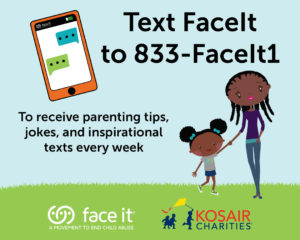
14 Apr What is a parent?
 In a world of helicopter parents, lawnmower parents, good enough parenting, attachment parenting, etc. who has it all figured out? Will the real Perfect Parent please stand up?
In a world of helicopter parents, lawnmower parents, good enough parenting, attachment parenting, etc. who has it all figured out? Will the real Perfect Parent please stand up?
During the month of April, we recognize National Child Abuse Prevention Month. This week, the Kosair for Kids Face It Movement is focusing on one aspect of the Protective Factors Framework: knowledge of parenting and child development.
When parents get it wrong, the critics, peanut gallery, and potentially Child Protective Services and the Courts are here to step in. But who is telling parents ahead of time how to get it right? You can buy the entire “What to Expect” book series to prepare yourself for what to anticipate from children and their development, but who prepares the parents with what they actually need to do? What does effective parenting really consist of?
To answer this question, I conducted a pop culture study through ABC’s reality show “The Parent Test.” Although the program was a fun competition (because we can never have enough of those) mainly for entertainment purposes, it was also hosted by an experienced parenting expert and included a handful of informative and eye-opening professional child-rearing guidance.
Here’s a bit of what I learned (Disclaimer: If you intend to watch the show, this blog does contain one finale spoiler at the end):
What is the ultimate goal of parenting?
To grow emotionally whole kids who can have healthy relationships and are prepared to navigate the world.
What are four key aspects of parenting?
Balance
Bubble wrapping kids is not good; it steals their challenges and steals their ‘hard.’ Parents need to find a balance between protecting their children and allowing them to experience the world. The more a parent can surrender power, the more it increases the child’s capacity to think critically and develop into responsible adults. Learning how to conquer fear, being able to step into uncomfortable situations, and experiencing disappointment and even total failure can help children develop resilience and instill a growth mindset. Firm limits, however, are still important for healthy and safe parenting. But this is best accomplished when respect for boundaries is appropriately paired with independence.
Repetition
Parents have a duty to teach their children and provide direction. They have wisdom and knowledge to impart. Children learn best and are the most equipped to follow a parent’s instruction when on their own from hearing parental teachings, lessons, and warnings over and over.
Communication
Being able to talk about difficult and embarrassing subjects is a vital skill every parent needs. Children need to be able to discuss tough subjects with adults. Some critical topics of discussion are stranger danger (including not to go with known persons to the family without explicit parent permission), how to handle and respond to bullying, and body safety and awareness.
Preparation
Parents need to give children direction and tools so they can be ready for the world. Rules give kids a plan. Not having rules in place can lead to high-risk behaviors and a lack of emotional intelligence. Emotional intelligence – the ability to manage your emotions and empathize with others – is a powerful predictor for later success in life. But while what we instruct is important, children model parent’s behavior, so what you do says more to them.
So, I know you’re all wondering, which parenting style won?
I won’t directly reveal this answer, but I do want to share that despite how tough parenting is, in the end it only took one stable, dedicated adult in a child’s life to display America’s most effective parenting style. While there may be data out there predicting poor outcomes for single parent homes, this information can be misleading and inaccurate when taken out of context and the full picture not known.
What’s most important, and what both the expert and the children on the show agreed on, is the greatest aspect of parenting is love. What children remember most is presence, nurture and affection, intention, safety and respect.




